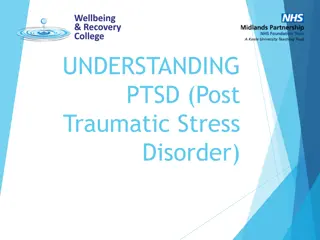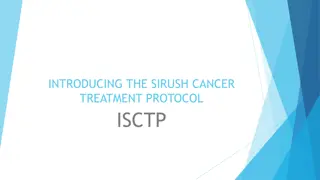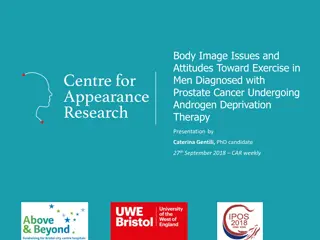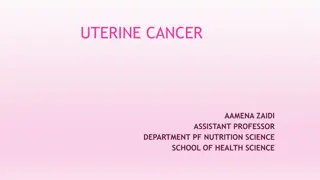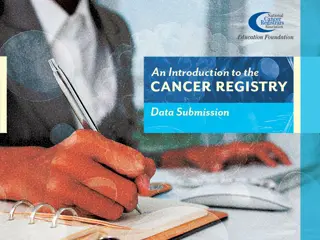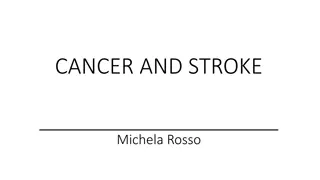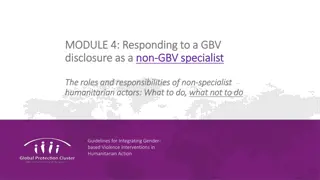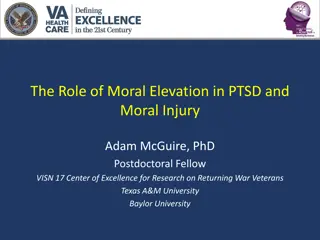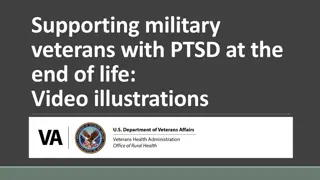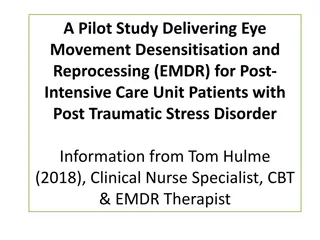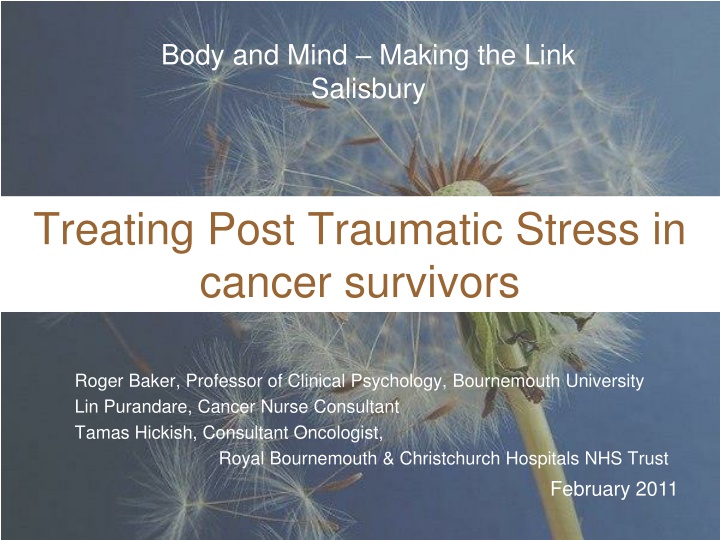
Linking Body and Mind: Treating PTSD in Cancer Survivors
In cancer survivors, post-traumatic stress disorder (PTSD) can have a profound impact on overall well-being. This article explores the treatment of PTSD in cancer survivors, highlighting a new therapy called Emotional Processing Therapy. The accidental establishment of the Bournemouth PTSD Clinic for Cancer survivors is also discussed. Additionally, the traumatic aspects of cancer, from diagnosis to treatment, are examined in detail through various images.
Download Presentation

Please find below an Image/Link to download the presentation.
The content on the website is provided AS IS for your information and personal use only. It may not be sold, licensed, or shared on other websites without obtaining consent from the author. If you encounter any issues during the download, it is possible that the publisher has removed the file from their server.
You are allowed to download the files provided on this website for personal or commercial use, subject to the condition that they are used lawfully. All files are the property of their respective owners.
The content on the website is provided AS IS for your information and personal use only. It may not be sold, licensed, or shared on other websites without obtaining consent from the author.
E N D
Presentation Transcript
Body and Mind Making the Link Salisbury Treating Post Traumatic Stress in cancer survivors Roger Baker, Professor of Clinical Psychology, Bournemouth University Lin Purandare, Cancer Nurse Consultant Tamas Hickish, Consultant Oncologist, Royal Bournemouth & Christchurch Hospitals NHS Trust February 2011
Describe treatment of PTSD in cancer survivors Describe a new type of therapy for PTSD - Emotional Processing Therapy,
The accidental birth of the Bournemouth PTSD Clinic for Cancer survivors
What is traumatic about Cancer? The big C first detection
What is traumatic about Cancer? Diagnosis
What is traumatic about Cancer? Surgery
What is traumatic about Cancer? Loss of breast
What is traumatic about Cancer? Loss of hair
What is traumatic about Cancer? Chemotherapy
What is traumatic about Cancer? Radiotherapy
What is traumatic about Cancer? Complications of therapy
Is Post Traumatic Stress Disorder an illness with a set of symptoms? The PTSD menu has 17 symptoms
Four psychological mechanisms Mechanism 1: Re-experiencing the event Flashbacks I suddenly see the face of the intruder Nightmares In my dream the cancer had returned and I was on the operating table having both breasts removed. The surgeons were trying to cut deeper and deeper saying we can t get it all out . My children stood around the operating table crying Sense of reliving the trauma, e.g. prisoners of war suddenly feeling they were back in captivity Intense psychological distress to trigger stimuli, hearing squealing tyres brings back the distress of the accident. Intense physiological distress to trigger stimuli, e.g. Chemo infusion, it s just a certain red... Even to think about that sort of red makes me feel... It brings back all the sick feeling and makes me feel a bit shaky .
Four psychological mechanisms Mechanism 2: Persistent increased arousal Difficulty falling or staying asleep Irritability, e.g. my fuse is much shorter. John (her husband) will make a joke and I jump down his throat Difficulty concentrating Hypervigilance Exaggerated startle response
Four psychological mechanisms Mechanism 3: Emotional numbing Lack of interest in important activities I have lost in socialising and in material things. I don t go shopping as much as and would rather stay at home where I feel safer Restricted ability to experience feelings all feelings ceased to be, at least on the surface, because one could not exist and at the same time live with such feelings of abhorrence, disgust and terror Feeling of detachment or estrangement from others My body feels much as if my head and body were separate. It s almost as if I am out of the room. I can hear your questions but they feel like they are at a distance
Four psychological mechanisms Mechanism 4: refers to a style of handling emotions Avoidance Avoiding thoughts, feelings or conversation associated with the trauma Avoiding activities , places or people that arouse recollections of the trauma.
An avoidant style of handling emotions Avoidance is not so much a symptom of PTSD but an emotional processing style that contributes to the development of PTSD
NICE recommends Prolonged Exposure for adults in a safe environment. (National Institute of Clinical Excellence (2005) Post Traumatic Stress Disorder (PTSD) : The management of PTSD in adults and children in primary and secondary care. Clinical Guidance 26. March 2005.)
Like behavioural exposure for obsessions and phobias, exposure for the PTSD sufferer means facing the memories of the trauma.
Problems with Prolonged Exposure therapy: Distressing Difficult to keep going Even trained therapists avoid using exposure Patients drop out Does not make sense to patients/contradicts their whole approach to trauma
Emotional Processing Therapy Includes everything in prolonged exposure but puts it into an emotional context which makes more sense to patients
Emotional Processing A process whereby emotional disturbances are absorbed and decline to the extent that other experiences and behaviour can proceed without disruption most people successfully process the overwhelming majority of the disturbing events that occur in their lives Rachman 1980
Grieving Death of a loved one Shock, unbelief, overwhelming grief Acceptance of the reality Continued grief, tears, sharing with others, thinking about loved one Funeral Further grief, life without them, working through issue Adapting and accepting Ultimately able to think about person, talk about person, without strong emotion Successful emotional processing emotional disturbances are absorbed and decline to the extent that other experiences and behaviours can proceed without disruption
A simple explanation The Problem; the traumatic memories have been buried and not properly emotionally processed The Solution; facing the memories allows emotional processing to take place and ultimately removes their emotional power
Before exposure sessions begin: Explore the patients emotional processing style, using the Emotional Processing Scale Their family s style of emotional processing How they have dealt with the trauma and previous life stresses Ask what they would have to do to process the traumatic memories?
: Explore the problems of suppressing emotions Explore the implications of opening a can of worms and prepare for it Share feelings generally with their partner, family Read Emotional Processing; healing through feeling . Throughout the whole therapy process discussions revolve around emotions
When exposure sessions start: The patient understands why it is important to face emotional memories
It is part of a lifestyle not just a nasty therapeutic procedure
They have already practised a more open style of sharing feelings
Case example Paula Diagnosed with breast cancer 5 years before numb at diagnosis. Surgeon surprised at her lack of reaction Surgery,chemotherapy,radiotherapy Good physical recovery PTSD diagnosed 5 years after cancer diagnosis
Case example Paula I haven t begun to deal with it Reads Emotional Processing;healing through feeling In discussing her emotional processing style numbness started in childhood Her reaction to unavoidable sexual abuse by family member Never processed
Preparations for Therapy We discuss importance of talking in detail and the problems which this could cause Preparations made for reactions to opening a can of worms Where to start? Decision abuse first, cancer later
Emotional Processing of abuse memories 6 sessions discussing details of abuse Understanding emotional reactions to the abuse and the rippling effect it had Discuss her mother s death through cancer Guilt over surviving
Emotional Processing of cancer memories Session 12 detailed retelling of mammogram, biopsy, cancer diagnosis Whereas Paula thought she had been emotionally numb she now experienced it emotionally Further discussions about the future
Complications in treating PTSD in cancer Multiple traumas Previous traumas eg.mother s cancer Family issues are so common it is difficult to stay focussed on the trauma Need to formulate sequence of issues to be treated Need to address physical complications of therapy eg aching limbs, drug side effects Other psychological sequellae eg.phobias Will it return?
Complications in treating PTSD in cancer Despite not being as focussed as prolonged exposure for other traumas the overall philosophy of Sharing opening up issues dealing with things facing hurts Emotional Processing Therapy fits well with the sort of general counselling approach that is needed
Plans for the future Teach and Mentor other cancer nurses to provide the therapy Start a PhD project to evaluate Emotional Processing Therapy in cancer
Paperbacks by Roger Baker for purchase





